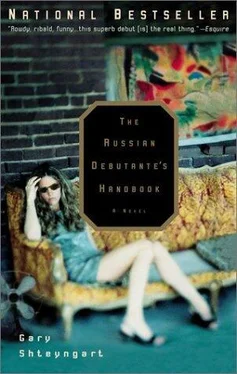Gary Shteyngart - The Russian Debutante's Handbook
Здесь есть возможность читать онлайн «Gary Shteyngart - The Russian Debutante's Handbook» весь текст электронной книги совершенно бесплатно (целиком полную версию без сокращений). В некоторых случаях можно слушать аудио, скачать через торрент в формате fb2 и присутствует краткое содержание. Город: New York, Год выпуска: 2003, ISBN: 2003, Издательство: Riverhead Books, Жанр: Современная проза, Юмористическая проза, на английском языке. Описание произведения, (предисловие) а так же отзывы посетителей доступны на портале библиотеки ЛибКат.
- Название:The Russian Debutante's Handbook
- Автор:
- Издательство:Riverhead Books
- Жанр:
- Год:2003
- Город:New York
- ISBN:0-7865-4177-6
- Рейтинг книги:4 / 5. Голосов: 1
-
Избранное:Добавить в избранное
- Отзывы:
-
Ваша оценка:
- 80
- 1
- 2
- 3
- 4
- 5
The Russian Debutante's Handbook: краткое содержание, описание и аннотация
Предлагаем к чтению аннотацию, описание, краткое содержание или предисловие (зависит от того, что написал сам автор книги «The Russian Debutante's Handbook»). Если вы не нашли необходимую информацию о книге — напишите в комментариях, мы постараемся отыскать её.
and
. The Russian Debutante’s Handbook Bursting with wit, humor, and rare insight,
is both a highly imaginative romp and a serious exploration of what it means to be an immigrant in America.
The Russian Debutante's Handbook — читать онлайн бесплатно полную книгу (весь текст) целиком
Ниже представлен текст книги, разбитый по страницам. Система сохранения места последней прочитанной страницы, позволяет с удобством читать онлайн бесплатно книгу «The Russian Debutante's Handbook», без необходимости каждый раз заново искать на чём Вы остановились. Поставьте закладку, и сможете в любой момент перейти на страницу, на которой закончили чтение.
Интервал:
Закладка:
“Oh, my poor people,” said Vladimir suddenly as the violence commenced. Why had he said this? He shook his head. Stupid heritage. Dumb multicultural Jew.
Among the few last passengers ascending the stairs, he did not even recognize Morgan. Foolishly, he was looking for her bright face to stand out with the luminance of a supernova, for a great, preternatural shout of “Vladi!” to shake the tarmac. Lacking all of the above, he ran nonetheless… Ran the way he was taught by Kostya and by life, ran toward her, toward the hum of jet engines, the sparkle of the sun on metal wings softly shaking, the unbearable sight of yet another landscape falling away beneath him as if none of it had ever happened.
He ran—there was not even the time to lie to himself that he would be back. And lies had always been important to our Vladimir, like childhood friends with whom one never loses an understanding.
EPILOGUE: 1998
I am playing an accordion on a busy thoroughfare
It’s too bad that happy birthday comes just once a year.
IT HAD BEENimpossible to sleep through the night. A summer storm had been steadily fortifying itself outside, trying to beat its way through the storm windows and stucco with a baleful announcement of Vladimir’s thirtieth birthday, just what he would expect from Nature’s cruel Ohio franchise.
Now, morning in the kitchen, barely seven o’clock, and sleepy Vladimir is eating his cereal with fruit. He spends half an hour watching the strawberries bloody his milk, while submerging his banana with perverse glee. One of Morgan’s gigantic brown hairs, trapped in the doors of a kitchen cabinet, is blown in an upward arc by a draft from the window like an index finger beckoning Vladimir.
Mornings are lonely nowadays.
Morgan, on leave from the clinic where she interns, is still asleep, her hands wrapped protectively around her spherical belly, which already seems to rise and lift independent of her breathing. Her eyes are teary and swollen from pollen season, her face is getting fuller and perhaps a little less kind in preparation for the third decade of her life. Unable to hear her from the kitchen, Vladimir listens to the house breathe, enjoying, the way his father always did, the imagined safety of the American home. Today, it is the inspired hum of some sort of electrical generator buried deep in the house’s subbasement, a hum that sometimes pitches itself into a roar, making the dishes chime in the dishwasher.
“Time to go,” Vladimir announces to the kitchen machinery and the curtains billowing with embroidered sunflowers over the sink.
HE DRIVES AROUNDthe tattered ends of his neighborhood where the overbearing single-family dwellings of the kind in which he lives give way to the rowhouses of the interwar era—charcoal black either by design or by the industry ringing the city, who can tell? Already, scraps of morning traffic are filling up the intersections; the Ohioans slowing down to let mommies and children cross. Vladimir, in the plush cocoon of his luxury utility vehicle, is listening to the scratchy wail of the Russian bard Vladimir Vysotsky—it is his favorite morning song, set in a Soviet mental asylum where the inmates have just discovered the mystery of the Bermuda Triangle on a television variety show and are full of disturbing suggestions. (“We shall drink up the Triangle!” cries a recovering alcoholic.)
And then, with a cloying twitter, the harbinger of annoyance, his car phone rings. Vladimir looks at it with uncertainty. Eight o’clock in the morning. It is time for the familiar birthday greetings, Mother’s annual State of the Vladimir address. From atop her glassed-in skyscraper in New York, the celebratory shouting begins: “Dearest Volodechka! Happy birthday…! Happy ne w beginning…! Your father and I wish you a brilliant future…! Much success…! You’re a talented young man…! We gave you everything as a child…!”
There is a long pause. Vladimir expects her to start wailing, but Mother is full of surprises this morning. “See,” she says, “I’m not even crying this year! Why should I cry? You’re a real man now, Vladimir! It took thirty years but you’ve finally learned life’s most important lesson— when you listen to your mother, everything turns out all right. Remember how I protected you in kindergarten? Remember little Lionya Abramov, your best friend… I used to feed you boys Little Red Riding Hood chocolate candy. So delicious. And you were such a quiet, obedient child. I could have wrapped you up in my love back then. Well, have they made you partner yet?”
“Not yet,” Vladimir says, minding the approach of an aggressive dairy truck. “Morgan’s father says—”
“But what a stupid whore he is,” Mother muses. “You married their family, you should be partner. Don’t worry, I’ll teach him a lesson when I come for the bris. And how is Morgan? You know, when I saw her last autumn, she wasn’t even pregnant, but I couldn’t help noticing… She was already a little fat. The thighs, especially. You should say something, in a very gentle American way, about the thighs… And if only she were a little blonder… Just think, the child would have brown hair and a nice round face… But who knows what God has in mind for us!”
“Every week you start with the hair,” Vladimir says, nervously combing over his dark curls with a free hand. “Is there nothing else to talk about?”
“I’m old, my treasure! I repeat things! An old woman! Almost sixty.”
“That’s not so old in this country.”
“Yes, but the hardships I’ve faced. The details. Always with the little details… I can’t sleep at night, Volodya… I wake up and the details are choking me. Why is my life so difficult, tell me, treasure?”
Vladimir examines a billboard advertisement for a newly built tire store. He suddenly wants to have his tires changed, to talk to the mechanics in blue smocks about his impending fatherhood and how he should conduct himself throughout the whole affair. He wants to join the simple brotherhood of America’s white men. And why not? As part of their new life, Morgan has already surrounded herself with a natural selection of young, attractive, child-bearing women who effortlessly mobilize the kitchen with their coffee-brewing as they glance at the passing Vladimir with a mixture of shyness and disbelief. “Mmm…” he says to Mother.
“Oh, what a healthy American boy you will have,” Mother continues. “I’ve seen one at a neighbor’s house. They even crawl differently here. Very energetic. Maybe it’s the diet.”
Vladimir puts the phone down on his lap and listens to the gentle trilling of Mother’s speech, waiting for her voice to descend into the reproachful whisper that signifies she has said all she needs to say. “Well, it’s time for me to go,” Mother sighs just as he picks up the phone once more. “These calls cost money. Always remember that we love you, Volodya! And don’t be scared of Morgan’s father. We’re stronger than these people. Just take what you want, sinotchek…”
They kiss each other good-bye, the sound of their puckers echoing through the ether. Vladimir drives on for a few silent kilometers. Despite the morning storm still massing overhead, the inept Ohio sun has managed to break through the clouds to blind Vladimir with its phony summer glare. The roads are lonesome and dry.
And then, as if the entire populace has simultaneously risen from slumber and finished gargling, the morning’s traffic begins in earnest. Vladimir fights his way onto a highway, the main artery leading into the city’s center, where a new vista slowly materializes, of gutted industry mixed with Orthodox onion domes supporting crosses as tall as smokestacks… And then, and then…
Читать дальшеИнтервал:
Закладка:
Похожие книги на «The Russian Debutante's Handbook»
Представляем Вашему вниманию похожие книги на «The Russian Debutante's Handbook» списком для выбора. Мы отобрали схожую по названию и смыслу литературу в надежде предоставить читателям больше вариантов отыскать новые, интересные, ещё непрочитанные произведения.
Обсуждение, отзывы о книге «The Russian Debutante's Handbook» и просто собственные мнения читателей. Оставьте ваши комментарии, напишите, что Вы думаете о произведении, его смысле или главных героях. Укажите что конкретно понравилось, а что нет, и почему Вы так считаете.












